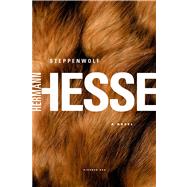- ISBN: 9780312278670 | 0312278675
- Cover: Paperback
- Copyright: 12/6/2002
With its blend of Eastern mysticism and Western culture, Hesse's best-known and most autobiographical work is one of literature's most poetic evocations of the soul's journey to liberation Harry Haller is a sad and lonely figure, a reclusive intellectual for whom life holds no joy. He struggles to reconcile the wild primeval wolf and the rational man within himself without surrendering to the bourgeois values he despises. His life changes dramatically when he meets a woman who is his opposite, the carefree and elusive Hermine. The tale of the Steppenwolf culminates in the surreal Magic Theater'”For Madmen Only! Originally published in English in 1929, Steppenwolf 's wisdom continues to speak to our souls and marks it as a classic of modern literature. Hermann Hesse was born in Germany in 1877 and later became a citizen of Switzerland. As a Western man profoundly affected by the mysticism of Eastern thought, he wrote many novels, stories, and essays that bear a vital spiritual force that has captured the imagination and loyalty of many generations of readers. His works include Beneath the Wheel , Narcissus and Goldmund , and The Glass Bead Game . Hesse was awarded the Nobel Prize in Literature in 1946. He died in 1962. Harry Haller is a sad and lonely figure, a reclusive intellectual for whom life holds no joy. He struggles to reconcile the wild primeval wolf and the rational man within himself without surrendering to the bourgeois values he despises. His life changes dramatically when he meets a woman who is his opposite, the carefree and elusive Hermine. The tale of the Steppenwolf culminates in the surreal Magic Theater'”For Madmen Only. Steppenwolf is Hesse's best-known and most autobiographical work. With its blend of Eastern mysticism and Western culture, it is one of literature's most poetic evocations of the soul's journey to liberation. Originally published in English in 1929, the novel's wisdom continues to speak to our souls and marks it as a classic of modern literature. A note on the translation: this is the first revised edition of Basil Creighton's translation of 1929. Joseph Mileck and Horst Frenz write of their 1963 revision, "In the revision we were intent upon a more exact and more readily understood rendition. British spellings and idioms have been Americanized, Germanisms removed, awkward sentences improved, and misleading translations corrected." "Hesse is a writer of suggestion, of nuance, of spiritual intimation."'” The Christian Science Monitor "One of the defining spirits of our century."'” Ralph Freedman, Professor Emeritus, Princeton University






